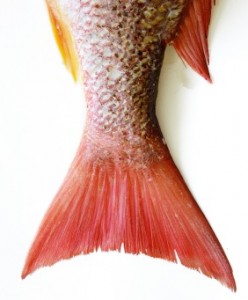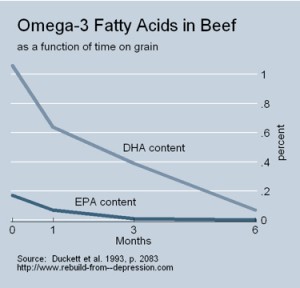Why Omega-3 Is The Smartest Fat For Burning Fat
As far as many people are concerned the jury is still out on who the guilty diet party is: the low-fat crusaders or the meat-chomping, fat-sucking protein-people.
If you swing by this site often enough you already know my opinion on this hot topic. But did you know that when it comes to a particular type of fat being good for you there is actually a truce of sorts between the afore-mentioned fat camps?
I’m talking about Omega 3 and I think you’d better pause for a moment and listen up: this stuff is so darn good for your health and for lasting fat loss that you’d be plain crazy not to get some in you at every meal.
Omega 3’s: The Smartest Fat For Health And Weight Loss
According to www.t-nation.com, Omega-3s “burn body fat in 3 different ways”
- “First off, they allow the body to burn fat in situations where fat burning is turned off, such as after a high-carb meal or after high-intensity exercise (where the body preferentially burns glycogen).”
- “Secondly, high amounts of omega-3s increase insulin sensitivity. If your body is sensitive to insulin, less insulin is produced after a meal, which means less fat is stored. Similarly, if the body is sensitive to insulin, and the hormone is properly managed, more stored fat is released and incinerated each day.”
- “Thirdly, omega-3s increase the heat of your cellular “furnaces”, which are otherwise known as the mitochondria and the peroxisomes. Omega-3s make these organelles burn more and more energy, thus turning you into a fat-burning machine.”
As if that weren’t enough to convince you, including more omega 3 in your diet is considered one of the simplest and most effective ways to reduce inflammation. And don’t think I’m just talking about sports injuries. I’m talking headaches, everyday muscular aches, chronic joint pain, arthritis, poor exercise recovery … what’s more, if you’re not consuming foods high in omega 3, or a good quality omega 3 supplement, then not only are you not helping reduce inflammation, you’re actually compounding the problem!
History shows us that humans living ‘in nature’ would typically consume around 35-40 grams of omega 3 each day, a ratio equivalent to the amount of omega 6 in their diet. This ratio is crucial to every aspect of your health – from your ability to build hormones, to your energy levels, your sex drive, the quality of your sleep, and most certainly your moods. But that’s just the start of it.
According to Charles Poliquin, every single disease or illness known to man is positively affected by the introduction of more omega 3’s in your diet. Problem is, it’s not so simple to consume that perfect 1:1 ratio these days. In fact, recent research shows that most of us are eating more like 1:20, and no, the higher number isn’t on the correct side.
What’s even more alarming is how easy it is to unknowingly sabotage your health and your body fat.
Let’s look at where you find omega-3. It’s most commonly found in natural animal foods such as fish, eggs, seeds, beef, and – to a lesser degree – green vegetables, especially the dark green ones, and there are three main types of omega 3’s:
- Eicosapentaenoic acid (EPA): EPA is found primarily in fish (bigger fish) and fish oil.
- Docosahexanoic Acid (DHA): DHA is especially important to your body, and is also found primarily in fish (smaller fish) and fish oil.
- Alpha-Linolenic Acid (ALA): ALA is found mostly in seeds, vegetable oils, and leafy green vegetables. It is converted into EPA and then into DHA in your body.
Doesn’t sound that hard, does it? Eat some fish, get your vegies in, and don’t miss out on the red meat now and then. Maybe a few capsules from time to time to top you up.
Don’t be so sure. The quality of the foods you’re eating plays a drastic role in the omega 3 content. What’s more, even the freshest, oiliest, best quality (wild as opposed to farmed or genetically modified) fish – salmon, for example – only has 2.6 grams of omega 3 per 100grams. Just how much fish are you going to eat each day to get your 35-40 grams? And if you’re overweight or suffering with any health complaint, you may need even more than that!
Of course, you could vary it with some beef or eggs, but first make sure you check out this chart. It depicts quite clearly how cattle fed on grain eventually loses all its omega 3 properties.
Oh and in case you’re wondering? Same rule applies with cage and even some free-range eggs. Couple this information with the knowledge that all food processing not only reduces omega-3 but increases omega 6 and you have a sure recipe for a fatter and less happy you.
So what to do?
Quality really does matter. At the end of the day it’s up to you whether you’d prefer to spend a little more now on the best fuel for a healthy, in-shape you, or if you’d rather save your pennies and foot increasing health bills. Not to mention an ever-increasing wardrobe.
Here’s how I make sure I get enough omega 3:
- When I can control it, I only eat organic and grass-fed meat
- Although I love fish, I eat it rarely due to high mercury content and difficulty in accessing wild fish. When I do choose seafood I go for the smaller oilier fish
- I eat green veggies at 3 meals each day
- Animal protein is a must at least 4 times per day (yep, that does mean I eat meat and veg for breaky, and I don’t care what you think, I feel great and it keeps me in shape!)
- I only eat seeds or nuts that are raw (cooking destroys the o-3) and organic (otherwise they are irradiated, which also destroys the 0-3).
- I minimise processed foods or foods containing trans fats. You already know there’s more than a handful of reasons why these ‘foods’ are not good for you, and now you have one more.
Of course I’m not perfect, and sometimes I eat on the run, or indulge in an unhealthy dinner out, and that’s fine. (It is fine to be human!). But I keep things balanced by taking 9 high-quality omega 3 capsules per day, split over 3 meals. This is not only a sound back-up plan, but a crucial way to ensure I have adequate omega 3. I never ever ever buy supplements off the shelf, and I wouldn’t recommend you do either. This is my preferred brand. For clients who are looking to lose body fat or improve an important aspect of their overall health, I typically recommend between 15 and 35grams of supplemented omega 3 per day. This depends on their hormonal profile and body fat percentage so don’t go making guesses! And yes, it is far higher than the RDA’s on the bottles, but those things (in my opinion) are equivalent to a prescription of a 1-minute workout. Ain’t gonna do nothing.
I believe everybody should supplement with omega 3 capsules or liquid and the results I’ve had using this theory in my business speak for themselves. As you read earlier, I eat more meat than average, it’s mostly organic, and I still supplement. Of course cavemen didn’t need to down capsules, but they lived what was basically an all-pure 100% organic lifestyle. It’s not only bad foods that rob you of omega 3, but toxins, chemicals and everyday stress.
Let me help you START NOW!
Let me help you kick start your journey to a healthy you!
LET’S LEAN IT UP WITH MY 21 DAY LEAN IT UP CHALLENGE!!
Want to Shed Some Extra Layers Fast and Reveal Your ‘New’ Best, You? Join my Lean It Up Challenge and Receive 21 Days of Meal Plans, Workout Guides, Motivation and Support to Help You Create the Body You Want – Fast!
If you’ve been struggling to form a consistent habit and get results or if you can’t shake that annoying last few kilos, then you NEED to be on this program. You will shape up FAST! It’s pretty simple. And the truth is you DO pretty much know what you should be doing, but that doesn’t mean you’re doing it!
I want to give you the kick up the butt you need to get revved up and organised about peeling off the extra layers in a way that is sane, healthy and gets results! The Lean It Up Challenge is based on the exact nutrition and training that I’ll personally follow when I need to get photo-shoot read!
So trust me when I say that this system works!
[button_1 text=”HELL%20YES%20KAT%20I’M%20READY%20TO%20LEAN%20IT%20UP!” text_size=”32″ text_color=”#000000″ text_bold=”Y” text_letter_spacing=”0″ subtext_panel=”N” text_shadow_panel=”N” styling_width=”40″ styling_height=”30″ styling_border_color=”#000000″ styling_border_size=”1″ styling_border_radius=”6″ styling_border_opacity=”100″ styling_shine=”Y” styling_gradient_start_color=”#ffff00″ styling_gradient_end_color=”#ffa035″ drop_shadow_panel=”Y” drop_shadow_vertical=”1″ drop_shadow_horizontal=”0″ drop_shadow_blur=”1″ drop_shadow_spread=”0″ drop_shadow_color=”#f796f8″ drop_shadow_opacity=”50″ inset_shadow_panel=”Y” inset_shadow_vertical=”0″ inset_shadow_horizontal=”0″ inset_shadow_blur=”0″ inset_shadow_spread=”1″ inset_shadow_color=”#ffff00″ inset_shadow_opacity=”50″ align=”center” href=”https://katloterzo.leadpages.co/leanitupchallenge/”/]
A snapshot of what my clients have to say!
“Thank you, thank you, thank you! I lost 10cm in Week One!” – Katrina Tuscano
“Holy moly! That first day workout makes me sweat more than my balance & combat classes combined. Awesome work! So far loving it! U rock Kat!” – Chason Gripton
READY GORGEOUS?!




There have been studies showing fish oils and omega 3 fatty acids may help increase weight loss and fat burning in individuals. Other health benefits of fish oils include a broad range of anti-inflammatory effects including a reduction in triglycerides and LDL cholesterol levels in cardiac patients.
This is a fantastic article which I loved reading. Katrina, you’re such an inspiration, you’re amazing. One thing to be concerned with is oxidative stress and your antioxidant status. There is a new theory of disease/degenerative – which focuses on fat metabolism and lipid peroxidation.
Although EPA and DHA are absolutely essential for proper cellular health – as constituents of cell membranes they determine cell receptor action, hormone binding, cell fluidity, signal transduction, ion channel function, and membrane-bound enzyme activity, is supplementation safe for everyone?
NOT according to http://raypeat.com/articles/articles/fishoil.shtml – in which the author finds EPA and DHA to have: “antithyroid, immunosuppressive, lipid peroxidative (Song et al., 2000), light sensitizing, and antimitochondrial effects, (and to depress) glucose oxidation (Delarue et al., 2003), (and contribute to) metastatic cancer (Klieveri, et al., 2000), lipofuscinosis and liver damage, among other problems.
“Without antioxidants, fish oil is massively degraded within 48 hours.”(Gonzalez, 1988; Klein, et al., 1990).
Those oils are extremely susceptible to oxidation, so it is essential that the person’s antioxidant status be assessed particularly vis n vis oxidative stress, exposure
to toxins, or radiation.
In addition there’s the mercury question: –
“A 2004 analysis of 44 kinds of omega-3 supplements by ConsumerLab.com,
based in Scarsdale, N.Y., found that none had unsafe levels of mercury
or PCBs.”
All in all it makes for interesting discussion….
Regards
This is a fantastic article which I loved reading. Katrina, you’re such an inspiration, you’re amazing. One thing to be concerned with is oxidative stress and your antioxidant status. There is a new theory of disease/degenerative – which focuses on fat metabolism and lipid peroxidation.
Although EPA and DHA are absolutely essential for proper cellular health – as constituents of cell membranes they determine cell receptor action, hormone binding, cell fluidity, signal transduction, ion channel function, and membrane-bound enzyme activity, is supplementation safe for everyone?
NOT according to http://raypeat.com/articles/articles/fishoil.shtml – in which the author finds EPA and DHA to have: “antithyroid, immunosuppressive, lipid peroxidative (Song et al., 2000), light sensitizing, and antimitochondrial effects, (and to depress) glucose oxidation (Delarue et al., 2003), (and contribute to) metastatic cancer (Klieveri, et al., 2000), lipofuscinosis and liver damage, among other problems.
“Without antioxidants, fish oil is massively degraded within 48 hours.”(Gonzalez, 1988; Klein, et al., 1990).
Those oils are extremely susceptible to oxidation, so it is essential that the person’s antioxidant status be assessed particularly vis n vis oxidative stress, exposure
to toxins, or radiation.
In addition there’s the mercury question: –
“A 2004 analysis of 44 kinds of omega-3 supplements by ConsumerLab.com,
based in Scarsdale, N.Y., found that none had unsafe levels of mercury
or PCBs.”
All in all it makes for interesting discussion….
Regards
Thanks for the comments Dave, Fish-Eye Dan .. although I have to say it’s strange that they’re word for word the same! I completely agree regarding the importance of a sound antioxidant status. As with any (good) supplements, quality fish oils are just one part of the equation and a full analysis should be carried out for optimal results. Mercury is an issue with pretty much all OTC fish oils in my experience and this is why I only use my preferred brand which I know to be completely safe.
Hi Kat,
What is your preferred brand for fish oils? The link in the article above does not seem to work.
Thanks 🙂
Oh, really, thanks for telling me! Poliquin: http://us.cpoliquin.com/Fish_Oil_Supplements_s/28.htm/?Click=71
Cool. Thanks for writing this. Its always awesome to see someone educate the community.
This is really good data, many thanks for sharing. Just thinking if you have got any suggestion on whether wheat-based dishes ought to be eliminated for shedding unwanted weight? From the things I understand, it’s a good-for-you food on the contrary I have been receiving contradicting thought processes on it. Would definitely be grateful for your validation or word. Many thanks.
I would cut out wheat and dairy for fat loss and definitely cut out all gluten for health for most people.